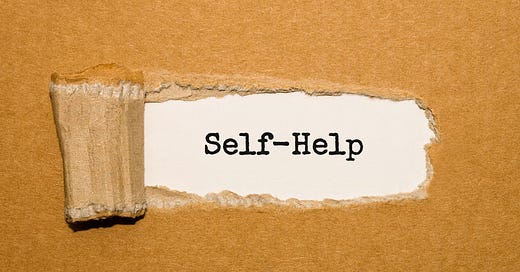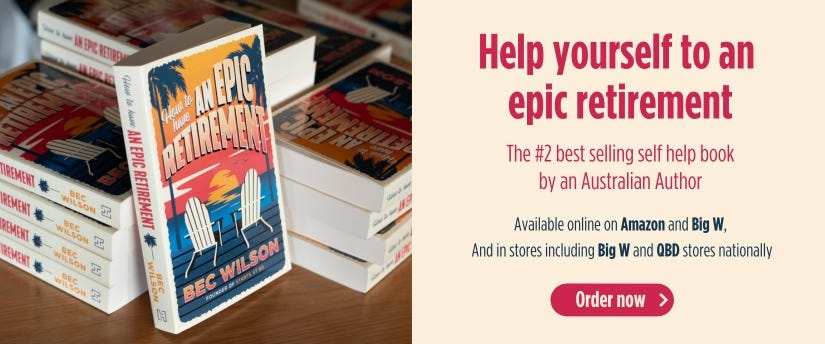How do you help yourself?
And, in the newspapers this weekend 'Nervous about retiring? You might be better off than you think'
In this edition:
Article: How do you ‘help yourself‘?
SMH/The Age: Nervous about retiring? You might be better off than you think
Prime Time: A practical guide to living alone and loving it
From Bec’s Desk: Hiking and writing!
How do you ‘help yourself‘?
I got a phonecall from a financial adviser I didn’t know last week who said to me “I’ve just had a new client sign on with me — the best client I’ve had in years! She understood retirement really well and what might be ahead of her and she was excited about it. She’d set her budget, written down her goals and was ready for advice when she walked through the door. She asked all the right questions - and when she got advice from us, she acted on it. She was really proactive,” he said.
The punchline — this woman had just completed the Winter Edition of the Epic Retirement Flagship Course. And the adviser wants all his clients to do it.
I was surprised that he was surprised! Why woudn’t you want to be proactive about shifting gears into retirement? I talked to a few superfunds about it during the week and they confirmed this advisers’ thoughts. Many funds have divided their members up into the ‘proactive people’, the ‘reactive people’, and the ‘inactive people’ as they traverse retirement. And they’re trying to work out how to help each group if they can.
I’m assuming most people reading this are ‘proactive people’, but I do think, in every group, there’s also a lurking group of people who are reactive, curiously watching on, not taking action. And I have no doubt, among your friends, you know some inactive people. You know the ones - those people who don’t make decisions actively and wait for life to happen to them, then wonder at how you achieved so much as a proactive person.
So today I want to talk about helping yourself in retirement. I think it’s a critical skill. It’s the self-helpers I meet that are doing modern retirement the best! They help themselves to information on how to navigate their finances, to ideas on looking after their health, and ways of living their lives well and they research them. Whether they are rich or not-so-rich financially, the self-helpers go out of their way to keep learning, finding ideas, testing them out and implementing them. And that is something I think we need to talk about more.
During our working lives, we’re constantly reminded of the importance of staying ‘up with it’. We know that staying relevant takes self-driven effort. What noone tells us is that, once we’ve left behind our formal years of education we’ve often got to take a ‘self help’ approach — reading, going to events, talking to smart people and then, developing our own views of what decisions and choices are right for us in the next stage.
As we move into this new phase, the need for learning is more crucial than ever. Why? Because without staying sharp, we risk missing out on great opportunities, getting hoodwinked by bad advice or locking ourselves into services that frankly aren’t right for us. We risk taking someone’s advice on social media at face-value instead of developing our own thoughts and knowledge too.
Let’s be real—things are changing faster than ever, and the best source of knowledge is a combination of well-trusted experts and advisers and our own well-developed nose for the truth.
Because the people we trust don’t always have the answers we need. Product companies want to sell you something, whether it’s right for you or not. Doctors are often too pressed for time to give you the deep dive you might need, and let’s not forget the shortage of financial advisers, leaving many unable (or unwilling) to afford advice. And to be honest—the world is evolving at such a speed that many busy professionals are struggling to keep up.
So, how do you take the same proactive approach you’ve used all your life and apply it to the years ahead to make the right decisions?
I’m a firm believer that we need to be more self-help-oriented at this stage of life. We’ve got to step up to the plate and gather information ourselves and make active judgements on what is ‘good’ information and what is information with a deeply vested interest. I see a huge difference between the financial circumstances and life satisfaction of those who are proactive self-helpers and those who are reactive (or heaven’s forbid, inactive), just waiting for things to happen to them to drive their decision making. And you know I’m always going to push you to be proactive!
So, if you feel like you’re not doing enough ‘self-help’ today, here’s how you can start:
1. Deliberately embrace a more active, learning mindset: Decide what you are going to learn about and be interested in, just as you did during your working years. Continue seeking out knowledge, but shift your focus to areas that will impact your retirement quality. This could be learning about new financial strategies, understanding the latest in health and wellness, or even picking up new hobbies that keep your mind sharp.
2. Embrace and leverage technology: The internet is a treasure trove of current information, but you need to be discerning. Start to work out which experts you want to follow, and where you can follow them. Look for reputable newsletters, leaders, online courses, and communities that align with your interests and needs. Consider using the calculators from your superfund or a reputable site like Moneysmart to help you better understand your money, before you get advice. Make sure you know a little about what you’re asking, before you ask an expert, in case they dont know what they should.
3. Network with peers and experts: Find people who are navigating the same transition. Whether through local groups, online forums, or even social media, connecting with others can provide insights into how they’re adapting and what’s working for them. (The Epic Retirement Club is a great place to start). It’s such a powerful thing to be able to ask someone ‘how they’re doing it’.
4. Stay skeptical of ‘Old Wisdom’: While it’s important to respect experience - really important! Don’t be afraid to question whether the advice you’re getting is still relevant, and moving with the current trends. The world is changing quickly, and what worked 10 or even 5 years ago may not be the most appropriate approach today given changes to longevity data, health advice, changing financial legislation and a world that has fundamentally shifted. You need to have your wits about you when people ‘guide you’ or ‘advise you’ using their own self-help insights - because often times, they come from good intentions, but they are incorrect.
5. And finally, and most importantly, accept you must be wise enough to be your own advocate: Whether it’s in health, finance, or lifestyle choices, you need to know enough about what lies ahead so you know what ‘good’ is and fight for it. Don’t rely solely on professionals who may not have the time or up-to-date knowledge to guide you fully. Instead, do your own research, ask questions, and seek second opinions and look for advisers and guides who stay as current as you need them to be.
Moving towards and into your epic retirement doesn’t mean you stop growing and rely on others to instruct you —it’s about shifting your focus and driving your ability to self-help into better shape for the challenges and opportunities ahead.
I’m almost half-way into writing my next book (called Prime Time) and I am pretty happy with how it’s coming together! A rainy week this week has kept me indoors and focussed all week so far. The finance section is almost done - a huge weight will be lifted when I get there. Just the examples to go - which is why I felt inspired for this week’s newspaper article below. The examples, when you calculate them out, for people in their 50s today are pretty inspiring (especially if you’re a proactive person). I wish we could get to everyone earlier to help them plan for retirement, and excite them about their prime time of life. When you see how disciplined retirement savings work, you see it really is worth planning for.
The Epic Retirement Flagship Course for Spring is underway and our week one has been dazzling with excited newbies and week two content has now dropped into the portal! Many thanks to Mark Lapedus who joined us for this week’s live Q&A event. Terrific insights on longevity. I love the first week of the course. Everyone is so hungry to learn everything all at once. There will only be one more course this year - our Summer edition starting in October. We’re taking expressions of interest on the website, and we’ll drop the dates and details out soonish so you can book a place! Register now for more info - it’s obligation-free to do so.
The Epic Retirement Club Facebook Group is certainly keeping us busy! It has blasted through 95,000 people in it all of a sudden, from all over the western world - which is great for all our curiosity on living life well. And our moderation team has expanded too. Many thanks to everyone who has been an active part of the conversation, helping people to navigate their pre-retirement and retirement experiences. And huge thanks to the mods! You all rock!
I’ve been training for my trek of the Three Capes in Tasmania in less than three weeks. 50kms in four days! Like a good first-time hiker, I’ve got new hiking boots and I’ve been walking Mt Cootha in Brisbane a few times a week - probably not a scratch on the four days of hiking ahead. But it’s getting me excited. Thanks for all your letters about what I’ve signed on for.
Have a great week ahead. You can always email me at bec@epicretirement.com.au. I love getting your letters. Until next week… make it epic!
Many thanks! Bec Wilson
Author, podcaster, guest speaker, retirement educator … Visit my website for more info about me, here.
Nervous about retiring? You might be better off than you think
Extract of article published in The Age, The Sydney Morning Herald, Brisbane Times, WA Today on Sunday 18th August 2024.
The above-average Australian approaching retirement is doing quite well, yet many don’t consider themselves wealthy, and they certainly don’t feel confident about how they’ll pay for their retirement.
If you’re in your midlife, heading towards retirement and feeling a bit nervous, you’re not alone. Even if you’ve done everything right – built up a solid super balance, paid off your home and kept your financial ducks in a row – it’s easy to feel uncertain about what the future holds.
The reality is, there’s a whole raft of pre-retirees and midlifers in Australia who are above average in the wealth stakes, yet still don’t feel as secure as they should.
Let’s take a look at some numbers to help you build your confidence. Currently, the average super balance for a 55-year-old male is $359,100, and for a 55-year-old woman, it’s $233,200. Those figures are the highest they’ve ever been for people at this age.
If you’re one of the 70 per cent of Australians who live as a couple, that gives you a combined super balance of around $592,100. Not too shabby, right? What you may not realise is that your best growth years are probably ahead of you, and if you keep working, that number can really only go up.
Retirement income is calculated as household income, so couples naturally have more to play with. Singles, on the other hand, may feel the pinch a bit more. But even then, they’re often better off than they think when they understand how money really works after retirement.
One of the biggest misconceptions about superannuation is that it stops growing once you retire.
There’s another reason you might be wealthier than you feel: nearly 80 per cent of 55-year-olds in Australia today own their own homes outright or with a minimal mortgage: usually between 0.6-0.12 of the property’s value at this age.
Considering the average Australian family home is closing in on $1 million, that’s a pretty significant asset under your belt. In addition, more than 1 million over-50s own rental properties. They’re the largest group of landlords in the country.
In my experience, there are three things most above-average but not wealthy people discount that, if they understood better, might ease their minds.
Read the rest of this article here in The Age, The Sydney Morning Herald, Brisbane Times, WA Today on Sunday 18th August 2024. It also appears in the print editions today.
A practical guide to living alone and loving it
In this episode, I sit down with Jane Mathews—author, advocate for solo living, and proud single woman—to chat about her book, Living Alone and Loving It. We dive into the perks and pitfalls of living solo in your Prime Time, and let me tell you, nothing’s off the table in this conversation! While the book might have been published a few years back, its insights are just as relevant for today’s Prime Timers.
LISTEN TO THIS EPISODE OF THE PODCAST HERE:












